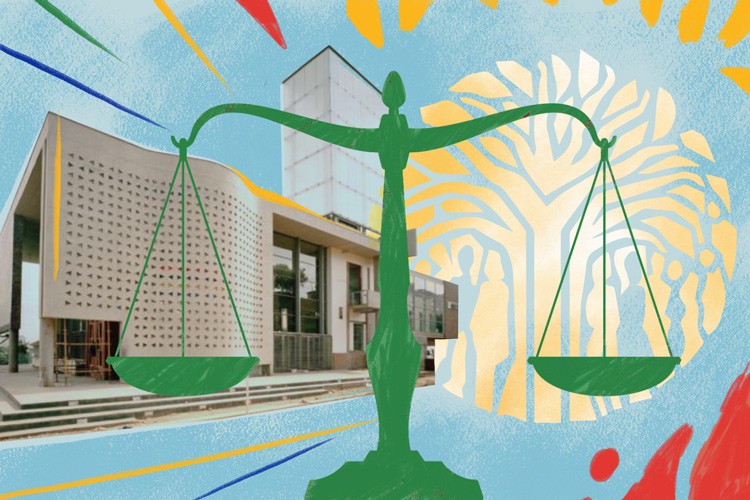Judge guilty of misconduct, but gets away with slap on the wrist
Judge Nomonde Mngqibisa-Thusi was late with dozens of judgments
Gauteng judge Nomonde Mngqibisa-Thusi has been found guilty of misconduct after failing to deliver dozens of judgments on time. Graphic: Lisa Nelson
- Gauteng Judge Nomonde Mngqibisa-Thusi is guilty of misconduct, the Judicial Service Commission has found.
- The Commission found she had failed to hand down dozens of judgments in a reasonable time.
- She had also failed to report to Judge President Dunstan Mlambo about this.
- However, the JSC cleared her of charges of gross misconduct.
The Judicial Service Commission (JSC) has found that Gauteng Judge Nomonde Mngqibisa-Thusi is guilty of misconduct for failing to hand down dozens of judgments within reasonable time-frames.
But the commission has cleared her of charges of gross misconduct which could have led to her being impeached.
It has ordered her to write a letter of apology to Judge President Dunstan Mlambo and to the attorneys affected by her tardiness within 14 days.
Mlambo is to “formally reprimand her” and issue her with a written warning.
In January 2023, the JSC asked the Chief Justice to appoint a judicial conduct tribunal to probe allegations against Judge Mngqibisa-Thusi of incapacity, gross incompetence and gross misconduct.
The allegations were based on a complaint by Mlambo that on at least 27 occasions she had failed to deliver judgments within a reasonable time, sometimes for as long as two years.
After hearing evidence, the tribunal said these allegations were “established as a matter of fact”, but found that she did not suffer from incapacity, nor was she grossly incompetent or guilty of gross misconduct.
However, she had taken no steps to avoid the delays when she should have done so.
Although she was ill and had spiritual challenges, these lasted for limited periods and she should have asked Mlambo for time to write the judgments, but she failed to do so, the tribunal found.
She did not take adequate steps to catch up on her judgment writing, instead she had picked up new reserved judgments.
Numerous enquiries were sent by attorneys but “she did not change course”.
The tribunal said her conduct did not amount to gross misconduct because she had a “spiritual illness” and delivered most of the judgments when she recovered.
“The evidence did not show that the public had lost confidence in her judicial abilities and, in 2023, there were no outstanding judgments,” the tribunal noted.
In considering the tribunal’s findings, the JSC agreed that Judge Mngqibisa-Thusi had committed misconduct, not only in not delivering judgments on time but more specifically in “her failure to report to the Judge President” about this.
While Judge Mngqibisa-Thusi submitted that she had reported her issues to the acting deputy Judge President “the commission does not consider this as sufficient”.
“The commission finds that there are strong mitigating factors. Firstly Judge Mngqibisa-Thusi suffered from her spiritual illness. Secondly, that illness was temporary. Thirdly, when she recovered from her illness, she was able to complete her judgments. Fourthly, in 2023, there were no complaints about outstanding judgments.”
In considering the sanction, the JSC said Judge Mngqibisa-Thusi was a senior judge and was aware of the applicable code of conduct, the need to deliver judgments timeously and the obligation to report the reasons for not delivering judgments to the head of court.
However, Judge Mngqibisa-Thusi had “begun a process to redress her past conduct”.
While the commission had considered a “financial sanction”, it was decided that this would not be appropriate, noting that in any event, it seemed that the Constitution did not allow for any suspension or deduction from a judge’s salary.
Support independent journalism
Donate using Payfast

Don't miss out on the latest news
We respect your privacy, and promise we won't spam you.
Next: PRASA taken to court over “illegal” eviction in Cape Town city centre
Previous: Wild Coast: Constitutional Court says no to Shell appeal bid
© 2024 GroundUp. This article is licensed under a Creative Commons Attribution-NoDerivatives 4.0 International License.
You may republish this article, so long as you credit the authors and GroundUp, and do not change the text. Please include a link back to the original article.
We put an invisible pixel in the article so that we can count traffic to republishers. All analytics tools are solely on our servers. We do not give our logs to any third party. Logs are deleted after two weeks. We do not use any IP address identifying information except to count regional traffic. We are solely interested in counting hits, not tracking users. If you republish, please do not delete the invisible pixel.

